Great news everybody: the sad times on The Legend of Korra are over! Well, for now, anyway. Thanks to the Amazing Airbending Kids setting out last episode, and thanks to Toph playing Iroh and, ultimately, thanks to Korra. I was glad to see the “recovery story” take a sideways turn in the second episode and become its own weird story about Korra seeking for answers, for help, for her own path. I appreciated that but I’m pretty much always glad for a gloomy plotline to wrap up in television. Now it has.
I wish Toph could be telling this story— “…and Sokka fell in a hole.”— but you’ve got yours truly instead. Alright! Korra learned important lessons! She overcame her own conflicts! Now let’s get out of this swamp and have Korra go solve some external conflicts. In sweet glorious bending battle and what have you.
Jinora may have inherited her grandparents’ prodigious talents, and Meelo might have the most visible resemblance to Aang, but this episode convinced me that Ikki is the one who inherited his attitude, his disposition. Watching her go all Wendy Bird on Earthbending Norm from Cheers and his buddy really charmed me. That’s Aang’s story writ small; the bedrock that leads to him showing mercy sparing the Firelord. It’s the epitome of Aang: “Oh, hey, did you guys kidnap me? Let’s talk through your problems!” I half expected it to turn into an homage to the scene in beginning of the Avengers, where a tied-up Black Widow is interrogating her target while pretending to be a damsel; either way, Ikki taking her arms out of the ropes every so often was classic Who Framed Roger Rabbit. Classic “Aang in the stockades.”
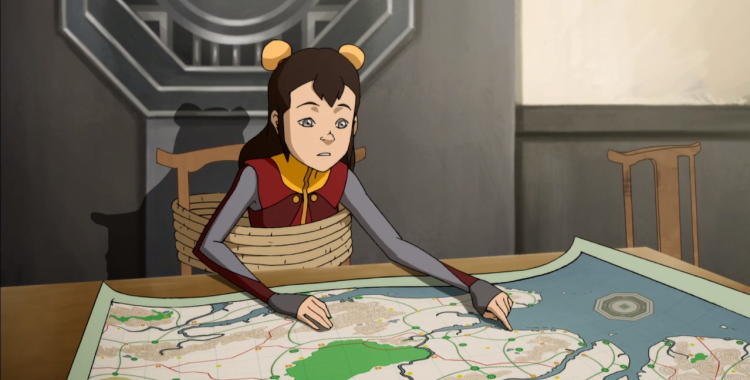
So no, this wasn’t a Jinora episode, but okay, if you want to get technical about it I suppose she had plenty of time to shine in the last book. Making this an Ikki episode was a smart call and it paid off; Ikki is a great character to get to know. Plus, a little pet-like Nausicaä! Meelo…I wish Meelo would…talk less. This whole “boys vs. girls” thing is something Sokka got slapped out of him in like, four episodes, and the scatalogical humor…is becoming tiresome, frankly. Watching him Blair Witch Project their food into the river…let’s just say I’m ready for his character to pivot into something less…annoying.
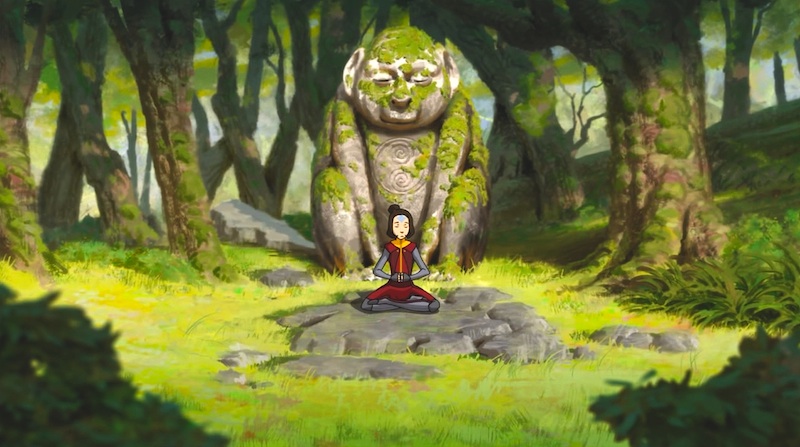
I don’t find him cute. Jinora functioned as a dowsing rod, and it was Ikki’s episode, but Meelo’s bits just rubbed me wrong. Except the bits with the berries; that I actually found spot on, pretty funny. I almost wonder if Kai and Meelo are characters that exist to mollify studio executives. “Okay, look, we have a young male character, so we hit that demo, can we get on with the show now?” I don’t know, I’m a believer in the idea that studios and teams can help tell stories, but we’ve all seen them meddle with or cancel shows, too, so maybe I’m a little overly suspicious, looking for bloody fingerprints.
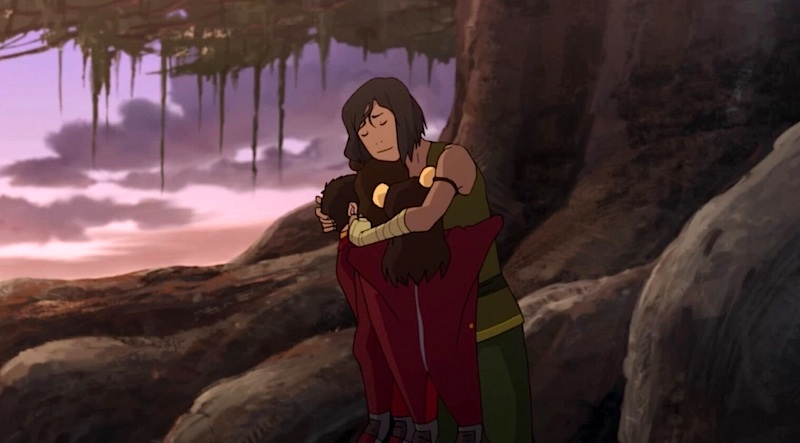
I have to say, the last thirty seconds of this episode I was convinced that my idle fancy of Toph being a g-g-ghost was definitely going to be confirmed. I thought the kids and Korra would fly off on Pepper, Toph would walk back inside, and then we’d see a skeleton in the bed. Dun dun dun! No dice but I’m not counting out the possibility of it happening later: Suyin and Lin reconcile with their erstwhile and estranged mother, and the: skellington! Or not. You know me, I like crazy theories.
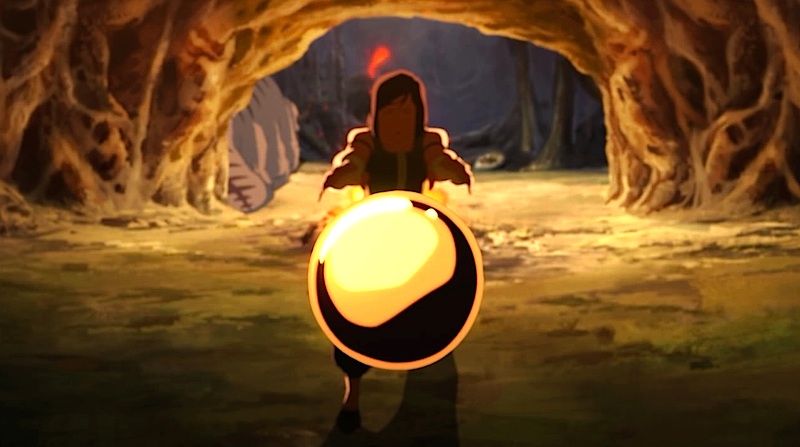
Speaking of theories, explaining them seems to be Toph’s role, and I’m glad for it: she was the person who made plot metaphors clear to Korra. We readers have been talking about the upsides of the philosophies of Amon, Unalaq and Zaheer; Toph lays it out for Korra. Amon cared about Equality, Unalaq cared about Spirits, Zaheer cared about Freedom. Each noble goals, but their actions compromised their agenda, their ideology. Korra has a lesson to learn from each of them. If anything, it makes me think a peaceful—well, an ultimately peaceful, I’m sure it will be a hard road to get there—resolution with Kuvira may be in the cards.
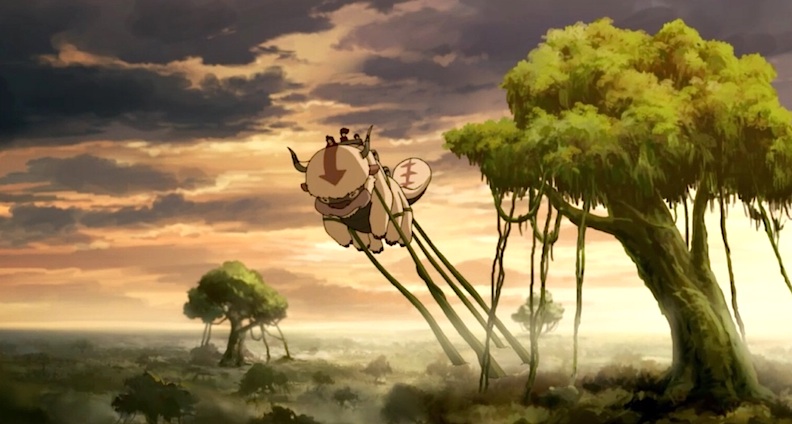
It’s a cliche to talk about a setting as a character, but the Foggy Swamp really hangs over the episodes where it appears, in both The Legend of Korra and in Avatar: The Last Airbender. It’s the swamp that becomes Dagobah and turns Toph into Yoda, shows Korra her deepest fears. It’s the swamp that grabs Katara and Aang’s grandkids the same way it once grabbed them. Jinora, Ikki and Meelo are mid-montage, mid-argument even, when the swamp intervenes. We see the vast banyan tree at the heart of it and I’m left wondering about the world-tree in the Spirit Realm, and Varrick’s experiments with Republic City’s spirit-vines. What’s next, Legend of Korra?
Mordicai Knode wants to put out a crazy idea: what if Lin’s dad was Huu? Tell him how wrong he is on Twitter or find him on Tumblr.










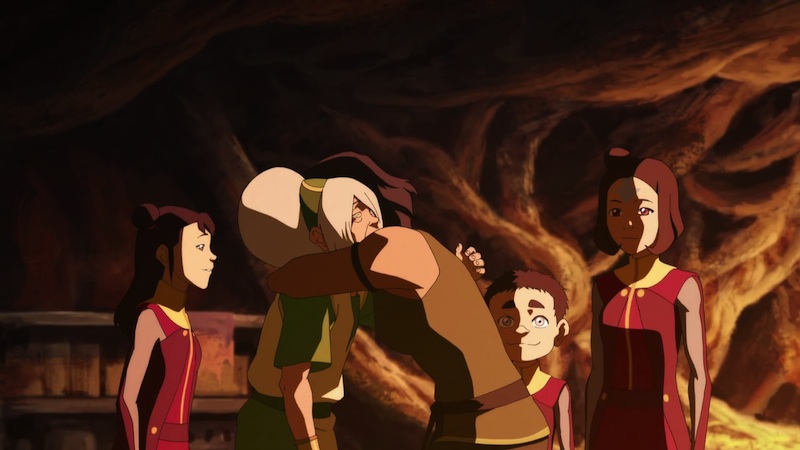
It was quite pleasant that this episode emphasized what we’ve been saying all along, that the goals of the villains weren’t bad things, but the actions are what tainted their movements.
I really enjoyed this episode, though yes, Meelo was annoying as fuck, I think that was intentional, but it failed to land in parts.
Fartbending is still classic though.
As an aside, The LOK Video Game just came out on XBox On Demand, and I tried out the trial and OMG!
I haven’t quite learned the mechanics for switching elements, the trial didn’t go that far, but I did try out the pro bending, at it looks like a lot of fun.
It’s created by the same studio that made Bayonetta, and I am so BUMMED I can’t play the sequel, so this looks like it will tie me over. The action is great and fast, the cut scene animation is GREAT, and so are the graphics.
The story takes place post Unalaq, and it has some nefarious spirit teaming up with the Equalist Chi Blockers to take out the Avatar.
1. Aeryl
I had tolerance for the annoyance because…yeah, sometimes kids can be a gadfly. Now he’s getting older; I need it to stop. The scatalogical stuff has worn thin for me, that’s all!
I have not played the game yet! I also just started the Mass Effect series but that is neither here nor there, unless I write it up…
Man, I miss Chi Blockers, those guys ruled.
I’ll be starting ME this weekend! Just gotta few more Bing points to go for my $3 off code, so I can purchase it for the ASTOUNDING price of $2!
The trial is only about 10 minutes of game play, it was mostly cut scenes!
They even got the ANNOUNCER!
I was a bit surprised to see them wrap up these conflicts so quickly, but then I got all excited. I’m hoping to see Korra meet up with Kuvira to get some try/fail cycles going, as a way to get the band back together.
This is going to be the last Korra season, right? Are we reasonably sure the end of this season is the sort of final standing point for the major characters, or is that false info I picked up along the way?
I agree — Meelo’s act is wearing very thin. He was annoying before, but his youth kind of excused it. Now he’s just become a self-important, hyperaggressive jerk, and I have no idea where he picked up this behavior (well, from Uncle Bumi, I guess).
And I agree — I think Toph’s lesson about well-intentioned extremists being out of balance will have a payoff with Kuvira. I think she’ll be the one antagonist that Korra manages to redeem and bring back into balance.
@@.-@: Yes, this season is the end for TLoK and probably for the Avatar universe onscreen; Bryan and Mike said in a recent interview (can’t remember where, sorry) that they’ve moved on to something different. There will be more A:TLA comics, though.
3. Aeryl
Oh fun! Is there a reason this is in the air? I thought I downloaded it for no reason but maybe I got advertised to or something? Or is it just a coincidence that we are both playing Mass Effect? I’m diggin’ it, but older games feel clunky & sluggish some times– I am curious how the controls evolve between games.
4. jaredwcooper
No, you are right on; this is the big finish. I think three episodes is plenty of time; I was even hoping for just one.
5. ChristopherLBennett
That Bumi thing is a good point, that’s totally a Bumi influence. Anyhow, enough hating on Meelo– it’s just that a friend disliked him right away & I defended him, but now I think I concede his point. I hate to lose an argument.
Right, this goes to the conversation at the end of the last thread– I didn’t chime in because I got to it too late & then I was writing this one– about Kuvira’s real world analogs, your Bolivars & Maos & Stalins & Godwins. Which I think is the point: I disagree with the whole argument. Kuvira has the potential to be all those people, & more– & maybe Korra can turn her into George Washington instead. & like Washington is an imperfect hero, as his wicked actions toward Oney Judge show, maybe Kuvira will have to live with the stain of her evil acts.
I both liked and disliked this episode. I loved the children, even Meelo! But I’m sad to see that Korra conquering her inner demons is not going to be a season long arc. It feels a little cheap to have one episode of really great mental and physical health representation and then just move on from it in the very next ep. That said, it is 3 years in show of Korra rehabing so I guess I can deal with it.
@6: But what you’re saying about potential is just what I was saying about Mao. When I read Mao’s early writings in Chinese history class in college, I saw him as a man who was striving for truly well-intentioned ideals, and who would’ve been horrified by the ways his older self abandoned and corrupted those ideals.
See, as I see it, the problem with Marxism is that it’s intrinsically a deeply idealistic and egalitarian philosophy, but it’s fatally, disastrously flawed because it relies too heavily on human perfectability. The idea that you can build a better world by just teaching everyone individually to be responsible and ethical for themselves, rather than imposing a set of laws and doctrines enforced by a state, is kind of lovely in theory, but it doesn’t work in practice because humans and human societies are just too complex, with too many potential error modes. A system that relies exclusively on individual ethics and responsibility has no built-in safeguards against corruption and abuse, and that’s why Marxist societies, which start out so egalitarian and well-intentioned, end up becoming dominated by corrupt dictatorships. It’s because there are no checks and balances on the people in power. Marxist theory insists that a dictatorship is necessary to redistribute wealth and create the new stateless utopia — and the fatal naivete of the theory is its assumption that an institution with absolute power can be trusted to work toward its own eventual dissolution. That never works, so “Communist” states always end up stalling at the dictatorship stage and never putting actual communism into practice.
In the case of Mao, he let his absolute power go to his head. He lost sight of the egalitarian principles he’d once held and believed he was entitled, even obligated, to force everyone to hasten his goals to fruition, at horrific cost to the people. That’s where Kuvira is headed. Her principles are sound, but her fatal flaw is her belief that she must hold absolute authority over everyone in order to achieve them. But maybe, unlike Mao, she can still be diverted from that path.
@8. If I remember my college history courses correctly, Marxism argues for a stateless society, but then Lenin came along and made the argument that the Dictatorship of the Proletariat was necessary to create the end state. I believe (honestly, the class was 20 years ago) the dictatorship of the proletariat was the definition of Marxist-Leninism. I’ll go check Wikipedia…
See– this sort of use of real world history…it’s a good critical tool, but I would caution against over-use of it.
@10: Of course I’m not drawing an exact analogy. I’m just explaining what there is about Mao — at least, the young Mao — that makes me think he’s a reasonable equivalent for Kuvira (certainly a better approximation than Hitler, who never had any positive intentions as far as I can tell). I see Mao’s story as a tragic one of an idealist who let power go to his head and horrifically betrayed his own original principles. That’s where I think Kuvira is headed if Korra isn’t able to bring her back into balance.
I am really grateful that this episode was centered on Ikki. Meelo is annoying, and Jinora is a Mary Sue. Ikki is just so sweet and adorable, and perfect to paliate the kind-of-meh-ness of the episode.
@8: um, not to start a flame war, but what you’re describing is not Marxism, it’s the popular (mis)conception of Marxism.
@12: My interpretation of Marxism is based on my studies of world history in college, not on “popular misconceptions.” If anything, the popular misconception of Marxism, as spread by the propaganda of capitalist nations, is that it’s an intrinsically dictatorial system. The fact is that it’s actually extremely populist in principle, but it never seems to work out in practice. Marx believed that societies needed to progress from agrarian feudalism to industrial capitalism to authoritarian socialism and eventually to stateless communism; but in practice, not only did most Communist parties arise straight out of pre-industrial agrarian settings, but they almost always stalled at the socialist dictator phase and never actually achieved the stateless endgame. No “Communist” nation has ever been actually communist in practice, because the name refers to a goal they’re supposed to be working toward but never actually reached.
So it seems to me that Marxism is an idea that’s extremely well-intentioned but fatally flawed, and I think the fatal flaw is that it lacks safeguards. I’m a firm believer that checks and balances are the most important part of achieving a just and stable society. I think they’re even more important than democracy. There have been plenty of nations that started out democratic but then turned dictatorial because there were no checks and balances to prevent an elected ruler from dissolving the legislature or rewriting the constitution on a whim. It’s the inbuilt balancing mechanisms in the US system of government that have kept it functional and successful for so long.
Which nicely brings us back on topic, because Book 4 is all about balance. Kuvira’s goals are honorable, but her methods are unbalanced, because she hoards all power to herself and doesn’t tolerate rivals to her authority. But it was that same absolute concentration of power that allowed the monarchy to run roughshod over the people and drive the kingdom to ruin. What Korra needs to do in order to divert her from a destructive path is to convince her that the well-being of the Earth Kingdom/Empire requires a system of checks on individual authority and a balance between different centers of power. Maybe some kind of ruling council that includes Kuvira, Suyin, and Wu — and maybe Bolin and/or Mako — but with the councillors as elected positions.
10: mordicai
I think it’s a valuable thing to look at what has come before in our history just to see what power has done to people. Because whether it’s history here, or thinking of the world of Avatar, it’s the humanity that makes things compelling.
I think it gets to be too much when we say that the creative team is using Avatar to create analogues to comment on things that have happened in our world. i.e. “I loved how Bryke used Zaheer to comment on the state of our world politics today.”
But I get what you’re saying too. One podcast I love to listen to is “Republic City Dispatch” (because one cannot get too much Korra), but one of the guys on the podcast is always looking for real world analogues and thinks that they’re intentional, and it kind of drives me nuts.
11. ChristopherLBennett
THIS statement I can get behind…I guess the crux of my argument is just that Kuvira’s fortunes haven’t been written…& that real world examples are hard because there are so many historical blinders & propaganda– from all sides– swirling around that I think our own historical position makes comparisons hard. They come with too much real world baggage.
12. Atlas
While I agree that discussions of communism– & politics in general– can be a touchy subject, I feel you are far closer to starting a flame war by calling Jinora names!!! /s
14. hihosilver28
Yeah! I think it isn’t a bad critical tool, but I do think that in this case, our own cultural context– to wit, the “capitalism versus communism!” political/historical narrative & the “the good guys beat the bad guys in WWII!” story– make it a crude tool for the purpose of taking this discussion too far. Especially because so much of what people are talking about– unspoken– is their “head canon” for Kuvira more than her actual actions. (Though I know others disagree with that.)
15. mordicai
Yeah, I completely agree. We honestly haven’t seen enough of Kuvira to know entirely what her motivations are, and I feel a lot of the fandom have already put her (and the rest of the season) in a box and automatically defined everything that is “going to happen” in the rest of the season.
@15: I guess the problem is that I’m having trouble communicating the intent behind my analogy because I’m looking at Mao in a way that’s different from what the name suggests to other people. I’m approaching it from the perspective of studying his younger self in my Chinese history class and thinking about who he was and what he was doing in the 1920s and 1930s — which I think is a good analogy for Kuvira because the Earth Kingdom is based on China and the TLoK timeframe is based on the 1920s. So I’m focused specifically on that part of Mao’s life, when his future wasn’t set yet. But other people probably know Mao mainly from his actions later in life, so the comparison I’m drawing to the young Mao isn’t coming across as clearly for them.
To me, this episode was made by the things Toph both said and didn’t say. When she spelled out the problem with Amon/Unalaq/Zaheer, I was like, “Man, normally this kind of audience hand-holding would really annoy me, but… I’m so happy they did it.” We’ve talked a lot about how the show has trapped itself by making each villain so overtly villainout by the end, but what’s always made that uncomfortable for me has been less the mustache twirling and more the danger of sinking the ideals with the mustache ship. (that imagery may have gotten away from me…)
But there’s always been a thin line, to my mind — and especially with younger audiences — between “this guy has good ideas DESPITE being evil” and “this guy’s evil taint invalidates his ideas.” The balance between good ideas/evil dudes never quite felt right, so I’m really glad that the show took it on itself to use a morally centered character like Toph put the mission statement explicitly into words.
But it’s what Toph didn’t say that I also thought was really important. She tells Korra that the latter has been disconnected for too long — disconnected from the people who love her and disconnected from herself. What she does not say which echoes loudly to the careful viewer across the whole exchange, and the one connection I expect the series to address in its climax, is that Korra is still disconnected from the rest of the Avatars.
And that’s one reason I REALLY don’t mind this “healing from Zaheer” storyline being wrapped up in a partial season. Korra is still very broken. There’s still a lot of work to do. And at least now she can kick ass while doing it.
I also noticed that when she was expelling the metal, the only fear we saw her dispell was the fear associated with Zaheer. I wonder if she still needs to expell Unalaq and Amon.
Meelo is too much.
But macaroon guy is my favorite. I hope they’re working on a macaroon guy show. Would watch.
17. ChristopherLBennett
Yeah, I think you are right; like I said, any real historical parallels are compromised by the fact that it is a charged cultural context; that’s why I have compared it to the Godwin rule….but Lake Laogai shows that the creative team aren’t afraid to make explicit real world allusions, either.
18. GarrettC
I think my “Korra fused with both Raava & Vaatu & that restores the link” theory is still pretty viable. I’m sticking with it (even after my wrong-wrong-wrong theory that Koh the Face-stealer was behind Amon…)
My favorite part of this episode (or was it the previous episode?) was:
Meelo: (something bombastic, arrogant, and annoying)
Ikki: Remember when he used to be so nice and sweet?
Jenora: Nope.